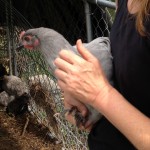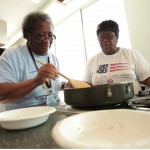It’s All About Control
by Jodi McKnight, PhD
My perception of food justice begins at the dinner table and ends in the mirror. When it comes to an attitude about what goes into our bodies, women have been faced with food issues for many years, and from many different forms of influence. Our obsessions with looking beautiful and being thin have been promoted by media and marketing campaigns for a very long time. But how do these perceptions develop and how do they last so long over time?
From the time little girls can feed themselves, they are given perceptions about food from their caregivers. Babies are considered to be cute when they are a bit chubby, but as girls grow, “chubby” is no longer considered cute, but considered a problem. But we still promote an attitude of cultivation with food. One of the first toys a young girl may get would be a plastic kitchenette set, teaching us how to cook and serve others food. Then comes the “Easy Bake Oven”, teaching us how to cook with electronic appliances, creating a chocolate desert to please others with. No one ever sees Barbie with a double-cheeseburger in her hand, then locking herself in the bathroom to get rid of it. But how does she stay so thin and beautiful?
But what happens at our own tables when comes to eating habits? Many of us belonged to the “Clean Your Plate Club”, before we even knew what it was. We were told that we couldn’t get up from the table unless we ate everything on our plate. We were forced to eat food we didn’t like, maybe food that wasn’t good for us, all in order to please and serve our parents. As we grew and developed, our bodies expanding and preparing for womanhood, the food we were forced to eat impacted our bodies in different ways, but impacted our self-esteem more deeply. If I was eating a cookie, someone would say “are you sure you want to eat that?” Immediately I felt ashamed for having a snack. After all, the old saying is “a moment on the lips leads to a lifetime on the hips”.
As I grew up, food was a constant in our home. My mother was an excellent cook, creating dessert masterpieces to please my father: cakes, pies, cookies, candy, and pastries – anything that was sweet. I learned at an early age that if you give someone a chocolate pie or a blackberry cobbler, it makes them happy. When someone dies, you take food to their home as a form of comfort. When someone is born, you take a casserole. After all, you rarely see a cookbook entitled “Stuff That Will Make Your Butt Big”… instead it’s called “Comfort Food”.
As a teenager and a student-athlete, I was always preparing for some sporting event like basketball or volleyball, therefore really never had any issue with my weight or food-intake. I was 5’9 and weighed around 155, which was big compared to other girls, but mostly muscle. Big because I was told I was big by other girls, coaches, parents, and boys. Incidentally, I felt confident in my body and knew that I was developing faster than others, so I took that in stride.
For the 4 years I was on the track team, however, I was given a different perspective. I wasn’t fast, and felt like people should only run if someone was chasing them, but I was strong thanks to years of volleyball and basketball. I threw the discus and shot-put. My coach called the few girls who did this the “Cow Team” because we weren’t made to run. A 60-something year old man calling girls he coached “Cows”. Again, someone was trying to impose their perceptions of weight and food on me.
It was during this time that someone close to me started to rapidly lose weight. I knew what eating disorders were, but was not formally educated on the topic. What I knew was that parents were fighting, she was running to the bathroom after every meal, septic tanks were bursting due to acid erosion, and her teeth were turning black. I began to feel as if I needed to fix this situation, even though it wasn’t mine to fix. Graduation was approaching and I had a decision to make: stay around and try to help, knowing there was nothing I could really do, or go to college and be in charge of my own life.
I attended university in St. Louis, where I studied psychology. I learned there was such a thing called “eating disorders” and my friend had it. It made sense now – the late night trips to the pantry, only to find a whole package of cookies had been demolished the next day. Stains on the bathroom floor by the toilet that couldn’t be scrubbed out. Chunks of food in hidden places within the carpet that would have to be replaced. Lives spiraling out of control. I knew this person had a problem with eating, and it was called Bulimia.
While working on my Master’s Degree, I took on an internship at a hospital that had a locked psychiatric unit for women with eating disorders. This is when it all fell into place. I had an epiphany…you can’t control the world around you (grades, parents, friends, school, lovers), but you can control what goes in your mouth, and what comes out. Healthy eating and the development of eating disorders was about control. Even the women who were admitted against their will to an inpatient psychiatric facility had the ability to maintain control of their eating behaviors. I learned that women with anorexia would hide their food in the hospital cafeteria and barter for goods with the women who had bulimia and binge-purge disorders. I learned that with a toothbrush, a hole could be made in drywall and a grilled cheese could be shoved in it. Parts of tennis shoes could be cut and food stored in it. Even when their competency was controlled by someone else, they still managed to control their eating.
As part of my internship, I ended up becoming the leader of an Overeater’s Anonymous group, as delegated by my supervisor at the hospital. I never felt as if I had any personal issue with food, but this was assigned as part of my education. To be a part of any 12-step group, one has to first admit they are powerless over whatever it is they struggling with. So for this group, we had to admit we were powerless over food. Not only did I learn what power food can have, but that it’s not all about food. The women that were struggling with this addiction of food were also struggling with other issues: sexual orientation, mental illness, alcohol and substance abuse, intimate partner abuse. Food was just one of the outlets they had for themselves – something they could control.
After getting a PhD in psychology, I became a professor and counselor for college-aged women. There are a lot of control issues there too. Most of the women I saw were athletes, giving up their control to play a sport and get their education paid for. They couldn’t control their classes, their personal relationship, their struggle with their spirituality, or their coaching staff, but they could control how much or how little they ate.
Again it came back to one’s ability to exert control. After my internship was completed, the relationships at the hospital ended, but my perception of food justice was forever altered. I looked at food in a whole new way, and looked at others’ relationship with food differently. The girl that I spoke of earlier, growing up I didn’t fully understand her obsession with food, the eating disorders that she had developed, and what it meant. It wasn’t until I was out of the circle that I realized the extent of the problem, which taught me something very valuable: I was too enmeshed to see the problem. Sometimes you don’t see the forest for the trees.
Before we tackle issues of food justice in the world, we must first address them in our own lives. We are too tangled up in or too involved to see the bigger picture. You can’t tell a woman who has anorexia to “just eat”. It’s about much more than food. We must develop a personal and healthy attitude toward food and help others to do so. Those who have lives that are out of control may abuse food, leading to eating disorders and unhealthy relationships with food – we need to recognize that. We shouldn’t pressure children, especially girls, to join the “Clean Your Plate Club”, but encourage healthy eating habits among children. We should stand up for those who are bullied by coaches, those that call them “Cows”. We need to teach others that even though their lives may be out of control, there are better ways to cope with it than taking it out on your own body. Food is a blessing and can be something that can be controlled on a healthy scale of proportion. We just have to maintain personal control.
———————
Dr. Jodi McKnight is an Assistant Professor of Psychology at Mid-Continent University in Mayfield, KY. She has a PhD from Capella University, where she obtained a Doctorate of Philosophy in Psychology. She is a professor of a variety of courses in psychology and counseling, and has been in practice for over 15 years. She has been a clinical supervisor for behavioral health programs in outpatient mental health, psychiatric rehabilitation and substance abuse services. She has written and attained grants for several behavioral health agencies, as well as published articles about online learning. She resides in Evansville, IN, with her husband and three children.













